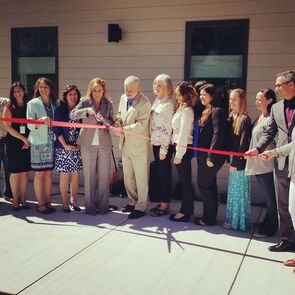
Behavioral Health Department Expands Crisis Services
The Behavioral Health Department has expanded mental health crisis services this year, with benefits for individual clients and the community as a whole.
Last year’s opening of SLO County’s first and only Crisis Stabilization Unit at the County’s Health Agency Campus in San Luis Obispo has significantly reduced demands on the 16-bed Psychiatric Health Facility.
A partnership with local hospitals means mental health providers are now available in local emergency departments. And a grant focused on youth triage will allow for a new program focused on responding to minors in psychiatric crises.
Crisis Stabilization Unit. In its first year, the Crisis Stabilization Unit served 271 individual residents with 307 total stays. At any given time, the Crisis Stabilization Unit allows medical professionals to stabilize up to four community members who are experiencing serious mental health issues. The primary goal of crisis stabilization is to prevent the need for individuals to be admitted to an inpatient psychiatric hospital setting. Other potential outcomes include:
After opening the Crisis Stabilization Unit, which is operated by Sierra Mental Wellness Group, law enforcement requests for admitting individuals to the County’s inpatient Psychiatric Health Facility reduced by nearly 48%.
Mental Health Providers in Local Emergency Departments. The Behavioral Health Department entered into an agreement this year with Tenet Healthcare, which operates Twin Cities Community Hospital and Sierra Vista Regional Medical Center in SLO County, to establish capacity for mental health crisis workers to be available within their emergency departments.
The County, extending its contract with Sierra Mental Wellness Group (which also operates the Crisis Stabilization Unit and provides the mobile Mental Health Evaluation Team program), has now placed qualified and trained mental health staff in each emergency department to provide mental health crisis evaluation, support emergency department staff, and facilitate transfer to the Crisis Stabilization Unit or Psychiatric Health Facility.
This project, being considered within other hospitals, creates more expedient care and reduces the length of stay in emergency rooms for individuals suffering from mental health crises.
New Grant to Support Youth in Crisis. The Behavioral Health Department successfully competed for a statewide grant from the Mental Health Services Oversight and Accountability Commission (MHSOAC) to provide a Youth Crisis Triage Program. With this grant, the County is expanding the mobile Mental Health Evaluation Team to include a specialist in youth crisis response, along with case management from a peer (person or family member with lived experience).
This three-year program will focus on crisis calls from schools and emergency departments. The program, which is set to launch by the end of the 2018-2019 school year, aims to serve more than 350 young people per year.
Crisis services are key to preventing and reducing the impact of psychiatric emergencies in the community. The expansion of crisis services with qualified and trained providers over the past year reflects the County’s values of responsiveness, professionalism, and collaboration, while promoting a safe and healthy community.
The Behavioral Health Department has expanded mental health crisis services this year, with benefits for individual clients and the community as a whole.
Last year’s opening of SLO County’s first and only Crisis Stabilization Unit at the County’s Health Agency Campus in San Luis Obispo has significantly reduced demands on the 16-bed Psychiatric Health Facility.
A partnership with local hospitals means mental health providers are now available in local emergency departments. And a grant focused on youth triage will allow for a new program focused on responding to minors in psychiatric crises.
Crisis Stabilization Unit. In its first year, the Crisis Stabilization Unit served 271 individual residents with 307 total stays. At any given time, the Crisis Stabilization Unit allows medical professionals to stabilize up to four community members who are experiencing serious mental health issues. The primary goal of crisis stabilization is to prevent the need for individuals to be admitted to an inpatient psychiatric hospital setting. Other potential outcomes include:
- reduction in depression and other symptoms
- reduced risk of self-harm
- prevention of criminal justice involvement
- improved school and work success
- increased engagement in supportive mental health treatment
After opening the Crisis Stabilization Unit, which is operated by Sierra Mental Wellness Group, law enforcement requests for admitting individuals to the County’s inpatient Psychiatric Health Facility reduced by nearly 48%.
Mental Health Providers in Local Emergency Departments. The Behavioral Health Department entered into an agreement this year with Tenet Healthcare, which operates Twin Cities Community Hospital and Sierra Vista Regional Medical Center in SLO County, to establish capacity for mental health crisis workers to be available within their emergency departments.
The County, extending its contract with Sierra Mental Wellness Group (which also operates the Crisis Stabilization Unit and provides the mobile Mental Health Evaluation Team program), has now placed qualified and trained mental health staff in each emergency department to provide mental health crisis evaluation, support emergency department staff, and facilitate transfer to the Crisis Stabilization Unit or Psychiatric Health Facility.
This project, being considered within other hospitals, creates more expedient care and reduces the length of stay in emergency rooms for individuals suffering from mental health crises.
New Grant to Support Youth in Crisis. The Behavioral Health Department successfully competed for a statewide grant from the Mental Health Services Oversight and Accountability Commission (MHSOAC) to provide a Youth Crisis Triage Program. With this grant, the County is expanding the mobile Mental Health Evaluation Team to include a specialist in youth crisis response, along with case management from a peer (person or family member with lived experience).
This three-year program will focus on crisis calls from schools and emergency departments. The program, which is set to launch by the end of the 2018-2019 school year, aims to serve more than 350 young people per year.
Crisis services are key to preventing and reducing the impact of psychiatric emergencies in the community. The expansion of crisis services with qualified and trained providers over the past year reflects the County’s values of responsiveness, professionalism, and collaboration, while promoting a safe and healthy community.
Behavioral Health Department Launches New LGBTQ+ Mental Health Initiatives

For the past two years, the Behavioral Health Department has worked with stakeholders to address mental health services needs for the LGBTQ+ population in our community.
This work has resulted in an LGBTQ+ needs assessment, two trans-trainings for behavioral health staff and providers, and a Mental Health Services Act (MHSA) Innovation project titled Affirming Cultural Competence and Provider Training: Offering Innovative Solutions to Increase LGBTQ Mental Health Care Access (SLO ACCEPTance).
LGBTQ+ Needs Assessment. The first initiative was the implementation of an LGBTQ+ needs assessment, developed in partnership with Cal Poly and QCARES and funded by the Behavioral Health Department Mental Health Services Act. It is the first study in SLO County to better understand the needs and concerns of the LGBTQ+ community.
The QCARES program developed and conducted a mixed-methods research study that included a comprehensive online survey and a series of in-person focus groups with community members of various backgrounds and identities. Some of the findings reveal the existence of barriers to seeking mental health support, including finding and accessing LGBTQ+ affirming or competent providers.
The study found:
Some of the recommendations of the study include the implementation and delivery of trainings to promote LGBTQ+ affirming practices for mental health providers, agencies, and community organizations; development and implementation of suicide prevention efforts; increase in services for LGBTQ+ youth; and the creation of a database highlighting LGBTQ+ affirming services and providers.
Transgender Cultural Competence Trainings. Next, the County provided trainings related to the transgender population in our community. A cultural competence survey completed by the Behavioral Health Department in fall of 2017 identified a need to prioritize training to support enhanced skills and knowledge providing services to the transgender community.
The first training was held in March 2018, with more than 50 County behavioral health staff and providers attending. The second training was held in July 2018 with over 55 attendees. The trainings addressed binary terms, myths and facts, how to become inclusive, reflections for therapists, tips to support the transgender community and more.
SLO ACCEPTance. The most recent initiative is the MHSA Innovation project SLO ACCEPTance. This project is intended to test the implementation of a new curriculum in SLO County that will best support mental health professionals in developing skills and knowledge to become LGBTQ+ affirmative as they engage with community members and provide services.
The project is currently reaching out to all mental health professionals countywide, creating a network of therapists serving all regions and representing various cultural populations and perspectives.
The County of San Luis Obispo Behavioral Health Department continues to work to become a more culturally and linguistically responsive, inclusive, and diverse organization. These LGBTQ+ initiatives are in line with the County’s values of responsiveness and collaboration, and further the vision of a healthy community.
This work has resulted in an LGBTQ+ needs assessment, two trans-trainings for behavioral health staff and providers, and a Mental Health Services Act (MHSA) Innovation project titled Affirming Cultural Competence and Provider Training: Offering Innovative Solutions to Increase LGBTQ Mental Health Care Access (SLO ACCEPTance).
LGBTQ+ Needs Assessment. The first initiative was the implementation of an LGBTQ+ needs assessment, developed in partnership with Cal Poly and QCARES and funded by the Behavioral Health Department Mental Health Services Act. It is the first study in SLO County to better understand the needs and concerns of the LGBTQ+ community.
The QCARES program developed and conducted a mixed-methods research study that included a comprehensive online survey and a series of in-person focus groups with community members of various backgrounds and identities. Some of the findings reveal the existence of barriers to seeking mental health support, including finding and accessing LGBTQ+ affirming or competent providers.
The study found:
- 68% of respondents did not know how to find an LGBTQ+ competent provider
- 60% of respondents reported having no LGBTQ+ knowledgeable mental health services in their neighborhood
- 74% of transgender and nonbinary respondents and 56% of LGBQ+ respondents reported that their distress is due, at least in part, to issues related to their gender or sexual orientation
Some of the recommendations of the study include the implementation and delivery of trainings to promote LGBTQ+ affirming practices for mental health providers, agencies, and community organizations; development and implementation of suicide prevention efforts; increase in services for LGBTQ+ youth; and the creation of a database highlighting LGBTQ+ affirming services and providers.
Transgender Cultural Competence Trainings. Next, the County provided trainings related to the transgender population in our community. A cultural competence survey completed by the Behavioral Health Department in fall of 2017 identified a need to prioritize training to support enhanced skills and knowledge providing services to the transgender community.
The first training was held in March 2018, with more than 50 County behavioral health staff and providers attending. The second training was held in July 2018 with over 55 attendees. The trainings addressed binary terms, myths and facts, how to become inclusive, reflections for therapists, tips to support the transgender community and more.
SLO ACCEPTance. The most recent initiative is the MHSA Innovation project SLO ACCEPTance. This project is intended to test the implementation of a new curriculum in SLO County that will best support mental health professionals in developing skills and knowledge to become LGBTQ+ affirmative as they engage with community members and provide services.
The project is currently reaching out to all mental health professionals countywide, creating a network of therapists serving all regions and representing various cultural populations and perspectives.
The County of San Luis Obispo Behavioral Health Department continues to work to become a more culturally and linguistically responsive, inclusive, and diverse organization. These LGBTQ+ initiatives are in line with the County’s values of responsiveness and collaboration, and further the vision of a healthy community.


